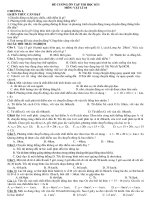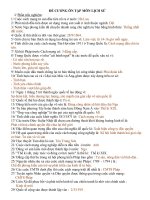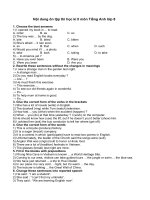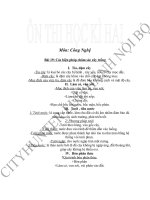Đề cương ôn tập thi học kì I môn tiếng Anh 7
Bạn đang xem bản rút gọn của tài liệu. Xem và tải ngay bản đầy đủ của tài liệu tại đây (181.18 KB, 7 trang )
<span class='text_page_counter'>(1)</span><div class='page_container' data-page=1>
<b>PHỊNG GD&ĐT QUẬN LONG BIÊN</b>
<b>TRƯỜNG: THCS NGƠ GIA TỰ</b>
<b>ĐỀ CƯƠNG ƠN TẬP HỌC KÌ I MƠN ANH 7</b>
NĂM HỌC 2017– 2018
<b>A. Grammar: </b>
I. Thì hi n t i
ệ ạ đơ
n, hi n t i ti p di n, t
ệ ạ ế
ễ
ươ
ng lai g n, t
ầ
ươ
ng lai
đơ
n, quá kh
ứ đơ
n v hi n t i
à ệ ạ
ho n th nh:
à
à
<b>Thì</b>
<b>Cấu trúc</b>
<b>Dấu hiệu nhận biết</b>
<b>1. Simple present tense</b>
<b> ( Hiện tại đơn)</b>
(+) S+ V / Vs / Ves …
(-) S + don’t/ doesn’t + V-inf…
(?) Do/ Does + S + V-inf…?
<b>Always, often, sometimes, never, </b>
<b>usually, every…</b>
<b>2. Present progressive </b>
<b>tense</b>
<b>( Hiện tại tiếp diễn)</b>
(+) S+ be + V-ing…
(-) S + be + not + V-ing…
(?) Be + S + V-ing…?
<b>Now, at the moment, at this time, </b>
<b>look !, listen!, be careful !</b>
<b>3. Near Future</b>
<b>(Tương lai gần)</b>
(+ ) S + be going to + V-inf + … (-) S
+ be + not + going to + V-inf +…
( ?) Be going to + S + V-inf +… ?
<b>Tomorrow, next, tonight….</b>
<b>4. Simple future tense</b>
<b>( Tương lai đơn)</b>
(+) S+ will+ V-inf…
(-) S + Won’t+ V-inf…
(?) Will + S+ V-inf …?
<b>Tomorrow, next, in the future</b>
<b>5. Simple past tense</b>
<b>( Quá khứ đơn)</b>
(+) S+ V II,ed…
(-) S + didn’t + V-inf…
(?) Did + S + V-inf…?
<b>Last, ago, in the past, when, </b>
<b>yesterday.</b>
<b>6. The present perfect </b>
<b>tense</b>
<b> ( Hiện tại hoàn thành)</b>
(+) S + have/ has + V-pp
(-) S + have / has + not + V-pp...
(?) Have/ Has + S + V-pp...?
<b>For, since, recently, late, yet, </b>
<b>already, just, never, ever….</b>
<b>II) Comparisons:</b>
<b>1) Comparative and superlative form (So sánh hơn và so sánh nhất):</b>
<b>SHORT ADJECTIVE</b>
<b>LONG ADJECTIVE</b>
<b>COMPARATIVE</b>
(so sánh hơn)
<i><b>S + is/ am/ are + Adj –er + than + S’</b></i>
<i><b>Eg: Her house is smaller than mine. </b></i>
<i><b>S + is/ am/are + more + Adj + than + s’</b></i>
<i><b>Eg: She is more careful than her sister. </b></i>
<b>SUPERLATIVE </b>
(so sánh nhất)
<i><b>S + is/ am/ are + the + Adj-est (+ N...)</b></i>
<i><b>Eg: Nam is the tallest student in my class.</b></i>
<i><b>S + is/ am/ are + the most + Adj (+ N…)</b></i>
<i><b>Eg: Minh is the most intelligent student in </b></i>
<i><b>my class. </b></i>
<b>Một số trường hợp cần nhớ</b>
Good
Better
Best
Bad
Worse
Worst
Little
Less
Least
Much/ many
More
Most
Far
Farther/ Further
Farthest/ Furthest
<b>2) Positive form (So sánh bằng)</b>
S + is/am/are + as + adj + as + S’
S+ is/am/are + the same + (N) + as + S’
Eg: Nga is as short as Ngan.
She is the same height as yours.
<b>III) Cách dùng của “ too /so”, “ neither / either”.</b>
* Too /so : cũng vậy ( dùng trong câu khẳng định )
Eg: I can swim and she can, too or so can she.
* neither/ either : cũng không ( dùng trong câu phủ định)
S + don’t / doesn’t / didn’t +MV –not , either.
S + do / does / did / M.V ,
<b>too</b>
.
<b>So</b>
+ do/ does /did / M.V + S
</div>
<span class='text_page_counter'>(2)</span><div class='page_container' data-page=2>
<b>Neither + do / does / did / MV + S</b>
Eg: She doesn’t like bananas and I don’t, either or neither do I.
<b>IV) Compound sentences: We can link two simple sentences to form a compound sentence using a </b>
coordinating conjunctioncs: and (for addition), or (for choice), but (for contrast), so (for a result)….
Eg: You should eat less fast food, or you can put on weight.
<b>V) Imperatives with more and less:</b>
- We can use the imperative for direct commands, orders or suggestions.
Eg: Eat less junk food and do more exercise.
<b> VI) Countable and uncountable nouns: </b>
MANY + Danh từ đếm được (Số nhiều), eg: How many apples do you
<b>like?</b>
Một vài, Nhiều
MUCH + Danh từ không đếm được, eg: How much meat do you
<b>need?</b>
Một vài, Nhiều
FEW + Danh từ đếm được (Số nhiều), eg: few books
Một ít
LITTLE + Danh từ khơng đếm được, eg: little milk
Một ít
A LOT OF = LOTS OF + Danh từ đếm được & ko đếm được
Eg: a lot of rice, lots of oranges…
Rất nhiều
- SOME + Danh từ đếm được & ko đếm được
- Some Dùng trong câu Khẳng định, khi chuyển sang Phủ định và
Nghi vấn phải dùng Any
<b>Eg: There are some eggs. But Are there any eggs?</b>
Một vài
<b>VII) PASSIVE VOICE: </b>
<b>Active voice</b>
<b>Passive voice</b>
<b>a. Present simple </b>
<b> </b>
<b>S + V/Vs-es +O S + am/is/are +PP(Ved/C3) +by O</b>
<b>S+ don’t/doesn’t +V S + am not /isn’t/aren’t +PP(Ved/C3) +by O</b>
<b>Do/Does +S + V? Am/Is/Are +S +PP(Ved/C3) +by O ?</b>
<b>b.Past simple</b>
<b>S + Ved/C2 +O S + was/were +PP(Ved/C3) +by O</b>
<b>S+ didn’t +V </b>
<b> S + wasn’t/weren’t +PP(Ved/C3) +by O</b>
<b>Do/Does +S + V? Was/Were +S +PP(Ved/C3) +by O ?</b>
EX : 1.Ann writes a letter. A letter is written by Ann
2. Ann wrote
a letter. A letter was written
by Ann
<b>Lưu ý: - Ta có thể bỏ by me/ by him/ by her/ by it/ by us/ by you/ by them/ by some one/ by </b>
<b>somebody/ by people trong câu bị động.</b>
- Trong trường hợp, câu chủ động có trạng ngữ chỉ nơi chốn thì ta đặt trạng ngữ chỉ nơi chốn trước by O,
trạng ngữ chỉ thời gian đặt sau by O.
<b> S + be + PP</b>
<b> </b><b> + địa điểm + by O + thời gian</b>
Ngày 24/11/2017
Nhóm giáo viên tiếng
Anh 7
Nhóm trưởng
<b>Trần Minh Xuân</b>
Tổ phó chun mơn
<b>Trần Minh Xn</b>
Ban Giám Hiệu
Phó Hiệu Trưởng
</div>
<span class='text_page_counter'>(3)</span><div class='page_container' data-page=3>
<b>B) Exercises: </b>
<b>I)</b>
<b>Fill each blank with How many or How much.</b>
1. ________ apples are there in the fridge?
1. _______ water is there in the bottle?
2. _______bananas are there in your bag?
3. _____ pepper are there do you want?
<b> II) Complete the following sentences with “too” or “either”.</b>
1. My friend likes photography, and I like it ____________.
2. My mother doesn’t enjoy horrible films, and my sister doesn’t ______.
3. I was not allowed to go to the show, and my sister doesn’t _______.
4. I love contry music, and I like rock and roll ____.
5. When I finish painting my room, I’ll do the kichen _____.
<b> III) Choose a/ an, some for the following words</b>
1. ________ apple
5. _______ pepper
2. ________ rice
6. _______ banana
3. ________ noodle
7. _______ eggs
4. ________ salt
8. ________ Pork
<b> IV) Write the correct determiner (some or any) into the sentences.</b>
1) There are _______ apples in my basket.
2) Do you buy _______ books?
3) There isn’t _______ milk at home.
4) I eat _______ soup.
5) These are _______ pens.
6) Have they got _______ money?
7) I am writing _______ tests today.
8) You can’t read _______ newspapers in this café.
9) Do you collect _______ stickers?
10)
_______ children are sitting in the park.
V) Reading:
<b>1. Water Puppetry</b>
Water puppetry is a traditional art form. It began in the 11
th<sub> cenury. It originated in the villages of </sub>
the Red River Delta of North Viet Nam. The show is performed in a pool. The puppets are supported by
string under the water and controlled by the puppeteers behind a screen, so they appear to be moving on
the water. The puppets are made of wood and then painted.
<b>1. True (T) or False (F):</b>
... Water puppetry is a modern art form.
…… Water puppetry began in the 11
th<sub> cenury.</sub>
…….. The show is performed in a swimming pool.
……… The puppets are made of wood.
<b>2. Answer the questions:</b>
1. When did water puppetry begin?...
2. Where does a water puppetry show take place?...
3. What are the puppets made of?...
4. Where did the water puppetry originate?...
<b>2. Pho – A popular dish in Ha Noi</b>
</div>
<span class='text_page_counter'>(4)</span><div class='page_container' data-page=4>
the best variety of rice.The broth for
<i>pho bo</i>
( beef noodle soup) is made by stewing the bones of
cows for a long time in a large pot. The broth for another kind of
<i>pho</i>
,
<i>pho ga</i>
( chicken noodle
soup) is made by stewing chicken bones. The chicken meat served with
<i>pho ga</i>
is boneless and cut
into thin slices… It’s so delicious.
<b>1.True (T) or False (F):</b>
... People can enjoy Pho for all kinds of meals during the day.
…… The rice noodles are made from the worst variety of rice.
…….. Pho is the most popular dish in Hanoi.
……… The chicken meat served with
<i>pho ga</i>
is cut into large slices.
<b>1. Answer the questions:</b>
5. When can we enjoy
<i>pho</i>
?...
6. How is the chicken meat served with
<i>pho ga</i>
?...
7. What are the noodles made from?...
8. How is the broth for
<i>pho bo</i>
made?...
3. Choose a suitable word from the box to fill in each gap to complete the passage.
<b> sang competition enjoys bought on</b>
Minh’s hobby is singing. She (1) ………singing very much. When her brother (2)
………a karaoke set last month, Minh was so glad that she (3) ………..every day after
dinner. She likes to sing only English songs. In fact, she has already sung all the songs found (4)
………the karaoke discs. Minh is singing in the karaoke (5) ………..organized by the
RC Center this Saturday. Her family is going there to support her.
<b>VI) Make sentences using the words and phrases given. </b>
<b>1. He/ has/ flu/./ he/ keep/ sneezing/ coughing/.</b>
...
2. Listen/ music/ in/ free/ time/ is/ my/ favourite/ hobby/.
...
3. My brother/ enjoy/ play/ piano/ when/ he/ young/.
...
4. In/ future/,/ I travel/ around/ Viet Nam.
...
5. Nhung/ already/ finish/ the homework/.
...
<b>VII) Rewrite each of the following sentences in such a way that means exactly the same as the</b>
<b>sentence printed </b>
1. The painting is bigger than the photograph. (not as …as)
The photograph...
2. They sell tickets at the gate of the tourist site.
Tickets ...
3. The market does not have any carrots.
There ...
4. They didn’t go camping yesterday because it rained heavily.
Because of ...
5. Be careful or you’ll hurt yourself.
If you are………..
VIII)
<b>Choose the best word or phrase (A, B, C or D) to complete each sentence below (2.0 points)</b>
1. “ ……… ! Can you tell me the way to the food shop?”
A. Thank you
B. All right
C. Listen
D. Excuse me
2. ……… that street and the food shop is at the next corner.
A. Go along
B. Turn right
C. On the left D. Turn on
3. I don’t often go to school by bus because it …………a lot of time. Riding a bicycle is more healthy.
A. spends
B. has
C. takes
D. gets
4. The doctor says my father will become ill ……….he stops smoking.
</div>
<span class='text_page_counter'>(5)</span><div class='page_container' data-page=5>
5. He bought …………. books and then left for home.
A. much more B. a few
C. a lot
D. a little
6. Ngoc ……….eating fast food because it’s not good for her health.
A. likes
B. loves
C. hates
D. enjoys
7. If you want to live long, you………….eat much red meat.
A. should
B. needn’t
C. have to
D. shouldn’t
8. Don’t read in bed, ………….you’ll harm your eyes.
9. I ………..playing boad games interesting because I can play them with my friends.
A. think
B. find
C. say
D. tell
10. Before moving to Ha Noi, my parents ………in Ha Nam.
A. have lived B. have been living
C. lived
D. live
11.Today, subjects like music and arts are put into the school __________ in Viet Nam.
<b> A.</b>
so
B.
too C. either
D. however
12. My cousin – Hoa, is the same age __________ me.
<b>A. </b>
as
B.
of
C.
to
D.
like
13. For many people, a good knowledge of music and arts is regarded as a __________ for every student.
<b>A. </b>
need
B. needs
C.
necessity D.
necessary
14. This year’s musical festival is not __________ it was last year.
<b>A. </b>
worse
B.
as good as
C. as well as
D.
different from
IX) Circle the word having different sound in the underlined part
1. A.food B. spoon C.good D.noodle
2. A.daughter B. sauce C.aunt D.laundry
3. A.was B. walk C.water D.wall
4. A.recycle B. collect C. cooking D.electric
5. A. map
B. hat
C. cap
D. what
6. A. sort
B. bottle
C. roll
D. coffee
7. A. daughter
B. sauce
C. aunt
D. laundry
8. A. was
B. walk
C. water
D. wall
9. A. morning
B. forget
C. pork
D. forty
10 . A. collection B. tradition C. exhibition D. question
11. A. usually
B. leisure
C. version
D.
composer
12. A. closure
B. leisure
C. pleasure
D.
sure
13. A. essential
B. traditional C. picture
D.
audition
14. A. discussion
B. vision
C. treasure
D.
decision
15. A. painter
B. prefer
C. concert
D.
perform
16. A. music
B. so
C. saxophone
D.
expensive
17. A. actor
B. guitarist
C. attract
D.
gallery
<b>X) Circle the odd one out</b>
1. A. grape B. banana C. egg D. apple
2. A. carrot
B. onion
C.
potato
D.
orange
3. A. beef
B. pork
C.
bean
D.
chicken
4. A. pear
B. melon
C.
peach
D.
salad
5. A. tea
B. yoghurt
C.
butter
D.
Cheese
6. A. apple
B. banana
C.
lemon
D.
pork
7. A. beans
B. eggs
C.
salad
D.
mushrooms
8. A. carrot
B. lamb
C.
beef
D.
pork
</div>
<span class='text_page_counter'>(6)</span><div class='page_container' data-page=6>
<b>Choose the word whose underlined part is pronounced differently from that of the others </b>
1.
A. ocean
B. special
C. receive
D. sociable
2.
A. sentence
B. letter
C. twelve
D. person
3.
A. reach
B. chore
C. such
D. chemical
4.
A. green
B. glass
C. gym
D. girl
5.
A. hobby
B. so
C. over
D. enroll
<b>Part C. Language focus: (15pts)</b>
I) Choose the best answer to fill in the blank: (10pts)
1.
I enjoy ________ badminton after school.
A. going
B. seeing
C. playing
D. doing
2.
The Japanese eat a lot of fish and healthy food, ________ they live for a long time.
A. but
B. because
C. or
D. so
3.
I ________ such a big fire before.
A. had never seen
B. never saw
C. have never seen
D. never see
4.
If it rains, we ________ camping.
A. go
B. are going
C. won't go
D. will goes
5.
My grandfather ________ many years ago.
A. has died
B. died
C. was dying
D. had died
6.
These flowers trees_______________by her mother everyday
A. are watered
B. water
C. waters
D. watering
7.
________ you like to go to the movies with me?
A. Could
B. Are
C. Will
D. Would
8.
There wasn’t ________ milk in the glass.
A. some
B. many
C. any
D. a few
9.
My sister’s taste in music is quite different ________ mine.
A. to
B. as
C.then
D. from
10.
I never watch ballet, and my sister doesn’t,________________.
A. so
B. either
C. too
D. neither
<b>II) Put the verbs in the brackets in the correct form: (5pts)</b>
1. Lan and her father (visit) ………..……….………..the Temple of Literature last week.
2. America (discover) ………..……….by Christopher Columbus.
3. (They/finish) ……….the project yet?
4. My brother hates (do) ……….…the same things day after day.
5. I think, in the future people (not play) ………….……… individual games
<b>.</b><b>Part D. Reading: (20pts)</b>
<b>I) Complete the passage with the words given in the box: (10pts)</b>
eat fresh
fish
drink
well
It's important to (1)________ well, especially when you are studying. If you are at primary school
you may not go home for lunch and have a cooked meal of meat or (2)_________ and vegetables. A
chicken and lettuce sandwich, with some (3)_________ fruit would be a light but healthy lunch. Many
people around the world eat plain, boiled rice two or three times a day.
Pupils and students often don't eat (4)________ when they're revising for an exam - they eat chocolate and
(5)________ lots of black coffee! And by the way, doctors say everybody should start the day with
healthy breakfast It's also good for you to drink a lot of water through the day.
<b>II) Read the letter and then answer the questions: (10pts)</b>
Water puppetry is a traditional art form. It began in the 11
th<sub> century. It originated in the villages of the</sub>
Red River Delta of North Viet Nam. The show is performed in a pool. The puppets are supported by string
under the water and controlled by the puppeteers behind a screen, so they appear to be moving on the
water. The puppets are made of wood and then painted.
9. When did water puppetry begin?
→………...
10. Where does a water puppetry show take place?
</div>
<span class='text_page_counter'>(7)</span><div class='page_container' data-page=7>
→………
12. Where did the water puppetry originate?
→……….
13. Is water puppetry a traditional art form?
→………
<b>Part E. Write: (20pts)</b>
<b>I)</b>
<b>Rewrite the following sentences without changing the meaning, using the word given:</b>
<b>(10pts) </b>
1. Her house is more beautiful than his. (not as …as)
→His house...
2. They sell tickets at the gate of the tourist site. (sold)
→Tickets ...
3. My sister enjoys listening to music. (interested)
→My sister is...
4. They didn’t go camping yesterday because it rained heavily. (so)
→It rained ...
5. She began playing the piano 3 years ago. (for)
→She has...
II) Rearrange the following words and punctuation marks to complete the sentences: (10pts)
1.
like/ the /playing/ I/ ,/ too / she/ piano/ and/ does.
→
………
2.
doesn't / wants / he / some / any eggs / cheese / he / but / want
→
………
3.
stamps / a child / Minh / since / collected / was / has / he.
→
………
4.
playing /Thanh /play /badminton /with/ interesting /finds / he /best friends/ because / it/can/his
→
………
5.
study/ you /will /if/ hard /,/ the/ pass/ you/ examination.
</div>
<!--links-->









